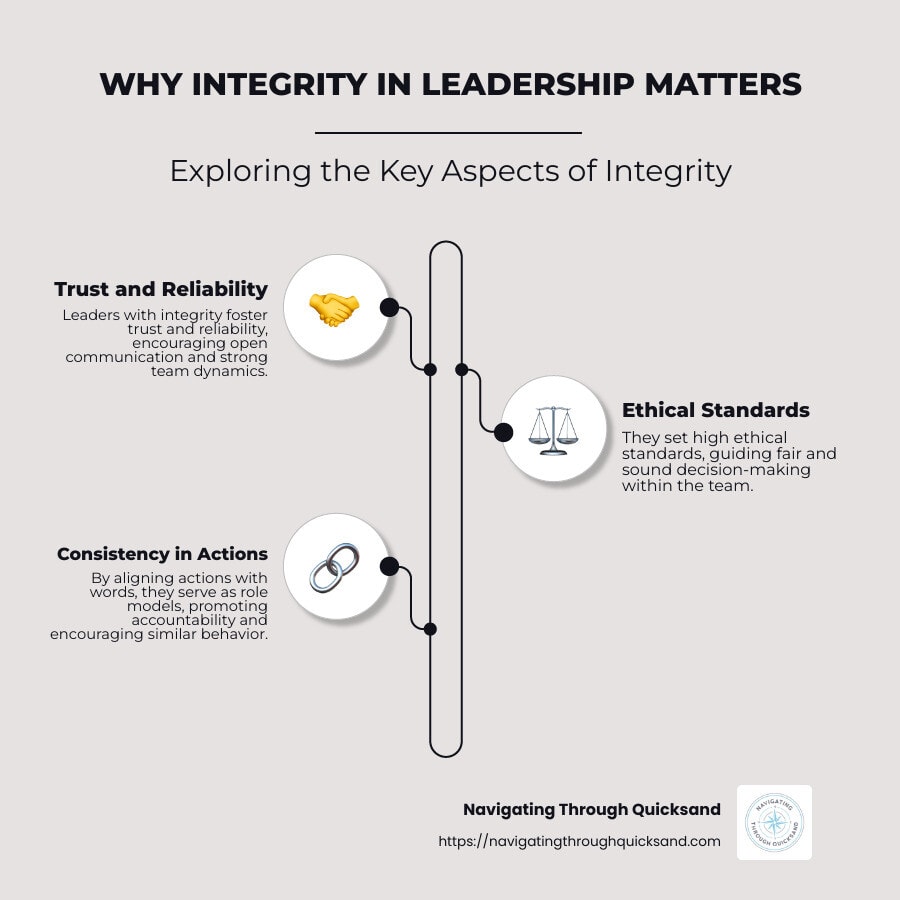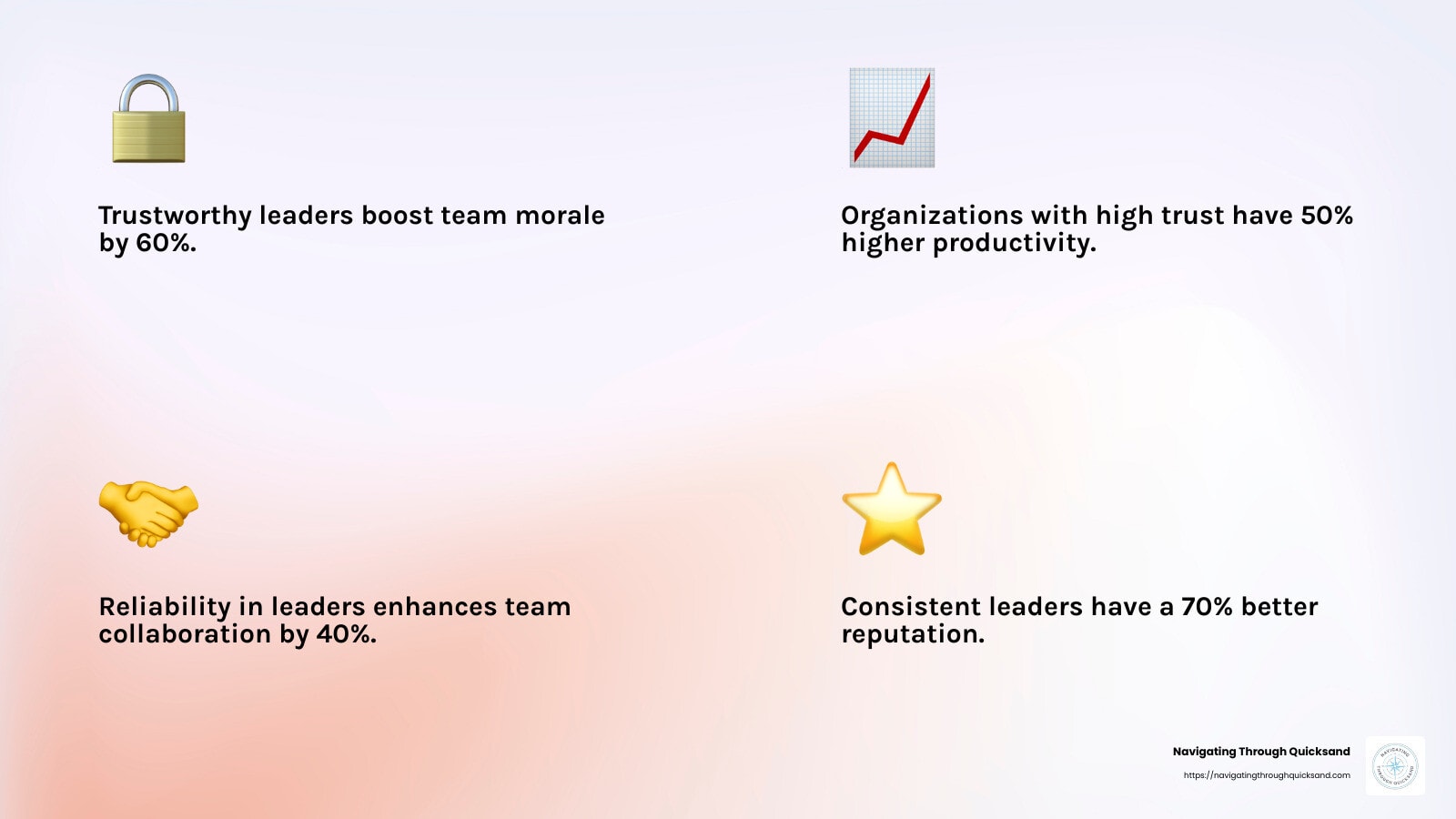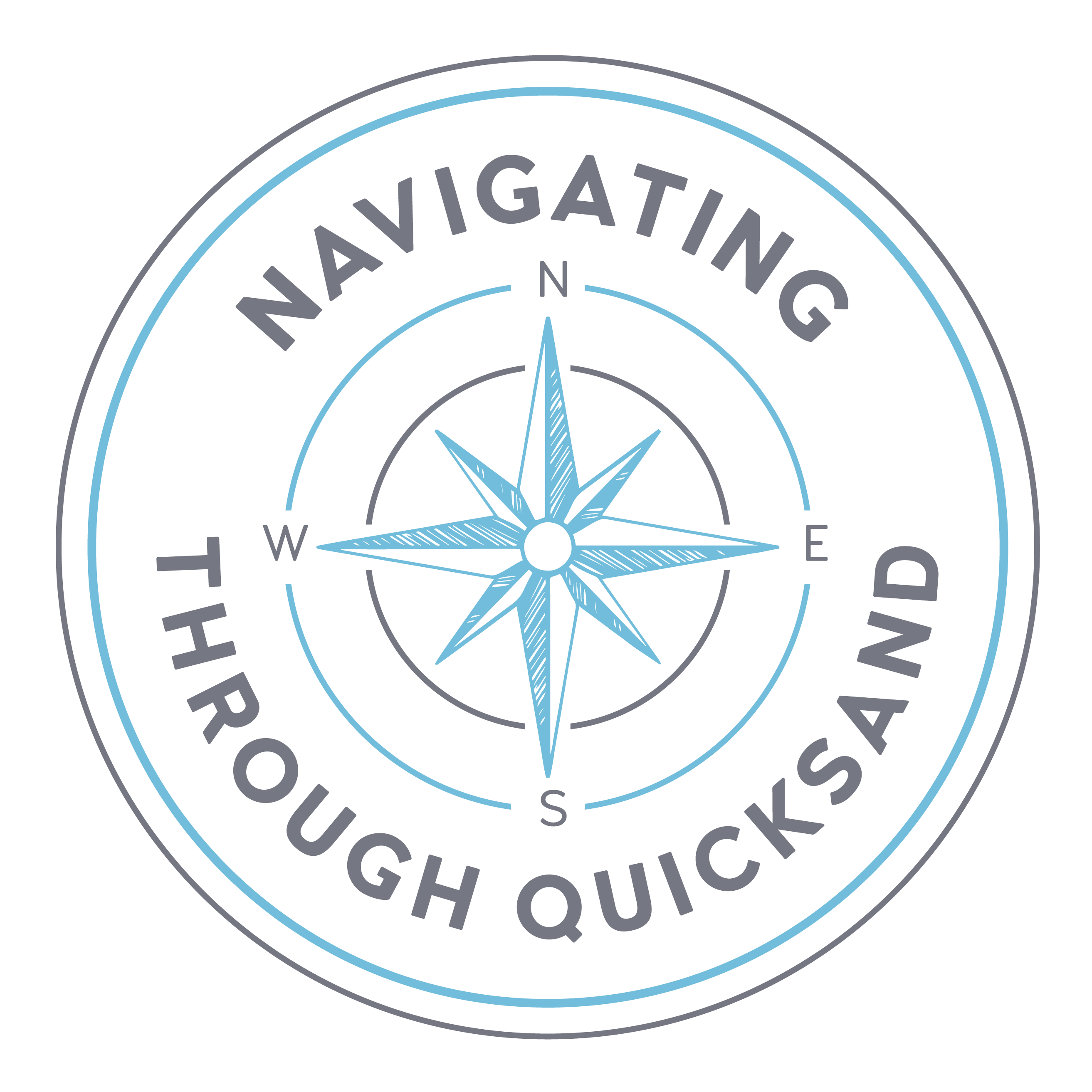Why is integrity in leadership important? In brief, integrity is the cornerstone of effective leadership because it builds trust, fosters ethical behavior, and establishes a foundation for success within any organization. Leaders with integrity earn respect and inspire confidence, creating an environment where collaboration and innovation thrive.
- Trust and Reliability: Leaders with integrity are seen as trustworthy and reliable, which encourages open communication and fosters strong team dynamics.
- Ethical Standards: They set and adhere to high ethical standards, guiding their team in making sound and fair decisions.
- Consistency in Actions: By aligning actions with words, leaders with behavioral integrity serve as positive role models, promoting accountability and encouraging others to follow suit.
In our complex and challenging world, navigating through life’s complexities can feel overwhelming. Yet, understanding the importance of integrity in leadership can empower you to transform challenges into stepping stones toward personal and professional growth.

Table of Contents
What is Integrity in Leadership?
Integrity in leadership is about aligning your actions with your values. It’s the unwavering commitment to do what’s right, even when it’s tough or unpopular. At its core, integrity involves holding oneself to high moral principles and ethical standards.
Consistency in actions is key. A leader with integrity doesn’t just talk the talk—they walk the walk. This consistency in a leader’s behavior builds trust among team members and sets a strong example for others to follow.

Moral Principles and Ethical Standards
Integrity means sticking to your principles, even when faced with pressure to do otherwise. Leaders with integrity prioritize honesty, fairness, and respect, aligning their actions with ethical values. These ethical standards guide their decisions and interactions with others.
Consistency in Actions
A leader’s words and actions should match, demonstrating behavioral integrity. When leaders consistently act according to their values, they create a reliable and trustworthy environment. This consistency not only builds credibility but also fosters a culture of accountability.
In summary, integrity in leadership is about being true to your values and maintaining ethical standards. It’s about consistency in your actions and decisions, which builds trust and respect within your team.
Why is Integrity in Leadership Important?
Building Trust and Credibility
Integrity in leadership, particularly a leader’s integrity, is the bedrock of trust and credibility. When leaders consistently align their actions with their values, they earn the trust of their team. This trust isn’t just a nice-to-have—it’s essential for effective leadership. Trustworthy leaders are seen as reliable and dependable, which improves their reputation.

Consider this: a high-trust organization can boost productivity by up to 50%. Employees feel safe, take risks, and innovate more when they trust their leaders. This trust leads to less stress and higher engagement, creating a positive work environment where cooperation thrives.
Promoting Ethical Behavior
Ethical leadership is about more than just following rules. Ethical leaders embody fairness, authenticity, and solve problems in ways that align with core values. Leaders who prioritize ethical behavior set the tone for their organization, promoting a culture where honesty and transparency are valued.
A leader with integrity acts as a role model, inspiring their team to follow suit. When employees see their leaders making ethical decisions, they are more likely to do the same. This creates a ripple effect, encouraging fairness and authenticity throughout the organization.
Moreover, ethical leadership improves decision-making. Leaders who are guided by strong moral principles can steer complex situations with clarity and confidence. They weigh the potential impact of their decisions on others, ensuring that their actions are fair and just.
Integrity in leadership fosters an environment where trust, respect, and cooperation are the norm. It improves relationships and ensures that decisions are made with the best interests of the team in mind. This not only strengthens the leader’s credibility but also contributes to the overall success of the organization.
The Impact of Integrity on Leadership Performance
Enhancing Team Performance
Integrity in leadership significantly boosts workplace performance. When leaders act with integrity, they create a positive work environment where employees feel valued and engaged. This isn’t just about being nice—it’s about fostering conditions where employees can thrive.
Imagine working in a place where everyone trusts each other. Employee engagement skyrockets because people feel safe to share ideas and take initiative. This leads to higher productivity and better results for the whole team.
A study showed that companies with high integrity leaders see a 20% increase in employee satisfaction. When employees are happy, their morale improves, and they are more likely to go above and beyond in their roles.
Fostering a Culture of Honesty and Transparency
Integrity also creates a culture of honesty and transparency. Leaders who are open about their decisions and actions build trust within their teams. This trust is crucial for encouraging accountability and ethical behavior.
In such an environment, employees are more likely to own up to mistakes and learn from them, rather than hiding errors out of fear. This accountability leads to continuous improvement and innovation.
Moreover, a transparent leader sets clear expectations and communicates openly, which helps in solving problems effectively. Employees know what is expected of them and feel empowered to contribute to the organization’s goals.
In summary, integrity in leadership not only improves team performance but also fosters a culture where honesty and transparency are the norm. This creates an ethical work environment that benefits everyone involved, leading to sustained success and growth.
How Leaders Can Demonstrate Integrity in the Workplace
Leading by Example
To lead with integrity, start by setting a strong example. Honesty and transparency should be at the core of your actions. When you make decisions, ensure they align with both your values and the company’s policies. This consistency shows your team that you value ethical behavior.
Being a role model means more than just following rules. It’s about living the principles you want your team to accept. When you act ethically, your team will likely follow suit. Actions speak louder than words, and your team is always watching.
Taking Responsibility for Actions
No one is perfect. Mistakes happen, but it’s how you handle them that matters. Taking responsibility is a cornerstone of integrity. If you make an error, admit it. Accountability builds trust and shows your team that it’s okay to be human.
Learning from mistakes is crucial. Discuss what went wrong and how to prevent it in the future. This not only helps you grow but also encourages your team to be open about their own challenges. A culture where learning from errors is valued leads to continuous improvement and innovation.
Honoring Commitments
Reliability is key in leadership. When you make a promise, keep it. Meeting deadlines and fulfilling promises demonstrate that you are dependable. This builds trust and credibility with your team.
It’s tempting to over-commit, but be mindful of your limitations. It’s better to say no than to break a promise. By being realistic about what you can achieve, you maintain your integrity and ensure that your team can rely on you.
In summary, leaders can demonstrate integrity by being honest, taking responsibility, and honoring commitments. These actions create a trustworthy and ethical workplace where everyone feels valued and engaged.
Developing and Maintaining a Culture of Integrity

Creating a culture of integrity and ethical values in the workplace is crucial for fostering trust and collaboration. Let’s explore how leaders can encourage open communication and provide the necessary training and resources to maintain this culture.
Encouraging Open Communication
Open communication is the backbone of a workplace where integrity thrives. When team members feel safe to express their thoughts and concerns, it builds trust and transparency. Here’s how leaders can foster this environment:
- Feedback: Regular feedback helps employees understand their strengths and areas for improvement. Constructive feedback should be a two-way street, where leaders are also open to receiving input from their team.
- Inclusivity: Make sure everyone feels included in discussions. Encourage diverse perspectives and ensure that all voices are heard. This inclusivity leads to better decision-making and a more united team.
- Psychological Safety: Create a safe space where employees are not afraid to speak up. When people know they won’t be punished for sharing ideas or admitting mistakes, they’re more likely to contribute honestly and openly.
Providing Training and Resources
To sustain a culture of integrity, continuous learning is essential. Equip your team with the tools they need to uphold ethical standards:
- Ethical Training: Regular workshops and training sessions can reinforce the importance of integrity. These sessions should cover real-life scenarios and ethical dilemmas to help employees steer complex situations.
- Workshops: Interactive workshops encourage engagement and allow team members to practice ethical decision-making in a controlled environment. This hands-on approach makes learning more effective and memorable.
- Continuous Learning: Encourage employees to seek out learning opportunities beyond the workplace. Whether through online courses, seminars, or reading, continuous learning keeps everyone informed about evolving ethical challenges.
By encouraging open communication and providing training and resources, leaders can build a robust culture of integrity. This not only improves trust within the team but also strengthens the organization’s overall ethical foundation.
Empowering Team Members through Integrity
Empowering team members is a crucial aspect of effective leadership, and integrity plays a vital role in this process. When leaders demonstrate integrity, they create a culture of trust and respect, which enables team members to feel confident and motivated. This, in turn, empowers them to take ownership of their work and make decisions that align with the organization’s values and goals.
Leaders who prioritize integrity foster a sense of accountability among team members, encouraging them to take responsibility for their actions and decisions. This accountability is not about assigning blame but about creating an environment where everyone feels responsible for the collective success of the team. When team members see their leaders consistently acting with integrity, they are more likely to emulate these behaviors, leading to a more cohesive and effective team.
Moreover, integrity in leadership helps in building a strong organizational culture where ethical behavior is the norm. This culture of integrity empowers team members to speak up, share their ideas, and take initiative without fear of retribution. As a result, the organization benefits from increased innovation, higher employee engagement, and ultimately, greater organizational success.
Overcoming Challenges to Integrity
Despite its importance, integrity can be challenging to maintain in the face of adversity. Leaders may face pressure to compromise their values and principles in order to achieve short-term gains or avoid conflict. However, compromising integrity can have serious consequences, including damage to the organization’s reputation and loss of trust among team members.
To overcome these challenges, leaders must prioritize integrity and create a culture of accountability and transparency. This involves setting clear expectations and consequences for behavior, providing feedback and coaching, and leading by example. When leaders consistently demonstrate integrity, they set a standard for the entire organization, making it clear that ethical behavior is non-negotiable.
Additionally, leaders can overcome challenges to integrity by fostering open communication and encouraging team members to voice their concerns. This transparency helps in identifying potential ethical issues before they escalate and ensures that everyone is aligned with the organization’s values. By overcoming challenges to integrity, leaders can create a culture of trust and respect that drives organizational success.
Leadership Development and Integrity
Leadership development is critical for creating a culture of integrity within an organization. Leaders who prioritize integrity must develop the skills and knowledge necessary to create a positive and productive work environment. This involves developing self-awareness, emotional intelligence, and social skills, as well as learning how to communicate effectively and make ethical decisions.
Self-awareness allows leaders to understand their own values and how they influence their behavior. Emotional intelligence helps leaders manage their emotions and build strong relationships with their team members. Social skills enable leaders to navigate complex interpersonal dynamics and foster a collaborative work environment.
Effective communication is also essential for leaders who want to demonstrate integrity. This means being transparent about decisions, providing clear and honest feedback, and actively listening to team members. Ethical decision-making involves considering the impact of decisions on all stakeholders and choosing actions that align with the organization’s values.
By prioritizing leadership development and integrity, organizations can create a culture of trust and respect that drives organizational success. Leaders who are equipped with the right skills and knowledge can empower their teams, foster accountability, and create an environment where ethical behavior is the norm. This not only benefits the organization in the short term but also ensures long-term success and sustainability.
Conclusion
Integrity empowers leaders to build trust and credibility. When leaders act with integrity, they create a safe and supportive environment where team members feel valued and respected. This trust fosters collaboration and innovation, allowing everyone to contribute to the organization’s success.
Our workshops, coaching, and speaking services are designed to help individuals develop their leadership skills by focusing on integrity. We provide tools and strategies that encourage leaders to lead by example, take responsibility for their actions, and honor their commitments. By doing so, leaders can cultivate a culture of honesty and transparency, which is essential for long-term success.
Contact us today at Navigating Through Quicksand, we believe that integrity is the cornerstone of effective leadership. Our mission is to empower individuals to steer life’s challenges and transform adversities into strengths. We understand that integrity in leadership is not just about making the right choices—it’s about inspiring others to follow suit.
We invite you to explore how our programs can help you or your organization accept integrity as a guiding principle. Visit our service page to learn more about how Navigating Through Quicksand can support you in turning challenges into opportunities and building a foundation of integrity.
When challenges are inevitable, integrity remains a steadfast guide. By prioritizing integrity, leaders not only improve their own effectiveness but also inspire those around them to strive for excellence. Together, we can create a future where integrity leads the way.
Frequently Asked Questions about Integrity in Leadership
Why is integrity important professionally?
Integrity and ethical conduct are crucial in the professional world because they build trust and respect. When leaders act with integrity, their teams know they can rely on them to be honest and fair. This trust leads to better cooperation and higher productivity. Employees are more willing to follow a leader they respect, which boosts morale and engagement.
In a workplace where integrity is valued, everyone feels safe to contribute their ideas without fear of being judged or dismissed. This openness fosters a positive environment where creativity and innovation can thrive.
What is the most important ingredient of leadership integrity?
The most important ingredient of leadership integrity is consistency. A leader’s behavior must consistently align with their words. This means following through on promises and maintaining ethical standards, even when it’s difficult.
Consistency builds trust because people know what to expect from their leader. It also influences the entire team, encouraging them to act with integrity as well. When leaders are consistent, they set a powerful example that others are likely to follow.
Why is integrity the key to success?
Integrity is key to success because it establishes a leader’s credibility and reputation. A leader known for integrity is seen as dependable and trustworthy. This credibility attracts opportunities and strengthens relationships with clients, partners, and employees.
Moreover, integrity-driven leaders are better equipped to handle challenges. They make ethical decisions that benefit the organization in the long run. This approach not only leads to immediate success but also ensures sustainable growth and stability.
In summary, integrity forms the foundation of effective leadership. It builds trust, fosters respect, and improves cooperation. By consistently demonstrating integrity, leaders can inspire their teams and drive their organizations toward success.
Our Content
Our content is carefully created and edited by Ashley Gustafson to ensure that the content is accurate, reliable, and up-to-date. Navigating Through Quicksand, LLC is a trusted inspirational woman, inspirational speaker, and personal development coach in Massachusetts for confidence coaching programs, training sessions, athletic training for varsity teams, support for collegiate athletes, and more. Navigating Through Quicksand, LLC has empowered individuals with over 15 years of experience working with students and athletic teams from local communities.



